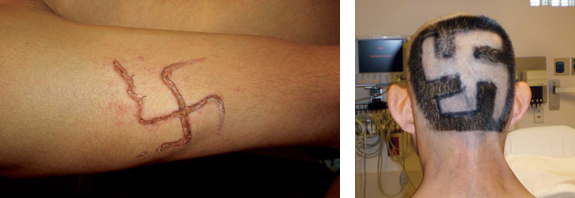Mentally Disabled Navajo Man Branded With Swastika
Three New Mexico men face charges in first known case filed under the Matthew Shepard and James Byrd Jr. Hate Crimes Prevention Act.
In the first known case filed under the federal hate crimes law signed by President Obama in 2009, three New Mexico men face charges after being accused of using a heated wire coat hanger to brand a swastika on a mentally disabled Navajo man.
Paul Beebe, William Hatch and Jesse Sanford each face one count of conspiracy and one count of violating the federal hate crimes law, also known as the Matthew Shepard and James Byrd Jr. Hate Crimes Prevention Act. They also face state felony charges of kidnapping, conspiracy to commit kidnapping, aggravated battery causing great bodily harm and conspiracy to commit aggravated battery.
They are accused of more than just branding Vincent Kee's arm in April 2009.
Police say they shaved a swastika on the back of his head, drew two horns on his forehead and wrote the words "White Power" across the back of his neck. None of this seems incidental. The men are believed to be associated with the white supremacist movement, and a search of Beebe's apartment turned up various items displaying Nazi iconography, including a Nazi flag mounted on a wall and a baseball bat painted with a swastika.
In his defense, Sanford's attorney claims Kee was a willing participant and that cell phone video footage shows Kee agreeing to the brand. It was meant, the men say, as a Navajo tribal symbol representing rolling water. Throughout history, the swastika has had many meanings, including its associations with many southwestern Native American Indian tribes — but its use by the Nazis is surely the most frightening and lasting associations.
The defense so far hinges on Kee, who suffers from fetal alcohol syndrome, a condition that diminished his mental capacity. Attorneys for at least two of the men say that alone is reason to doubt Kee's claim that the branding and markings were done against his will. Defense attorney Eric Morrow wrote that police and other adults convinced Kee that the branding was a criminal act. "At this point, his words are not his own," Morrow wrote in court filings.




